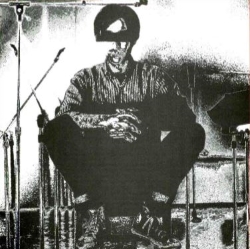
Creative Process
“I can’t over-emphasize that the very basis of the existence of my studio is economy. One, most recording studios are just too expensive. They usually have to charge what they do, of course. No one’s blaming them. I know what equipment costs. I just chose not to do big bank loans to overreach and have my debt dictate my rates.
“Two, the music industry is a pack of dogs, sniffing each other’s butts, and once in a while one of them issues forth with some crap like Milli Vanilli, and the rest of them start chasing their tails to produce their version of the same thing. You cannot, as a creative individual, bust into something like that and get the big budgets that allow you to produce your material if you are coming in with something really unusual.
“If you are a normal creative person, and you create music, and your music is really something that will sell in today’s splintered economic environment, then how do you manufacture it? Never mind distributing it to the marketplace. If you have a budget of dollars that you’ve saved from being a librarian or a construction worker of $4,000 or $5,000, you can’t go to a regular 16- or 24-track studio. You’ll kill your budget and you won’t finish your project. You not only won’t be able to attract manufacturers and distributors, you won’t get something you can deliver to your gigs and sell.
Artistic Expression vs Equipment
“The commercial studios will, of course, argue that the level of production, even the artistic skill level of the employees, is better in a commercial studio, and that the level of equipment is better, and therefore the product is better. I completely disagree with this. The level of artistic production, the skills that go into what I work on, artistic expression and creativity, are the same in any room.
“Yes, in an upscale room you can work with more and better tools than we have. Consequently, you are better able to exact higher fidelity individual sounds than we might be able to do, right now. I emphasize right now because digital disk-based technology and R-DAT will truly give everyone great fidelity for not much money very soon. But that’s not to say that first -rate, marketable, sellable product can’t come out of a studio like this, 16- track, small-format analog. Remember the Sergeant Pepper lesson: dual 4- tracks.
“The analogy to all this is the beautiful granite and marble sculptures that the Italian artisan’s of the Middle Ages created with hand tools, wooden hammers and alloy chisels. The beauty of that art has yet to be surpassed by compressed air-driven chisels and laser etching and alignment tools. Tools are important, but they aren’t a substitute for craft. And you can’t rush craft. Studio rates, dictating tighter budgets and compressed production schedules on independent projects, of course, rush craft. We don’t. Our rates don’t cause it. The chisel can’t be allowed to become more notorious than the artist. Is it that hard to grasp?
Legality
“We’ve spent a fair amount of money putting production into an illegal spot. Actually, we’re only quasi-legal. We’re zoned for some kinds of business in this neighborhood. There are small corner stores and things, but to be honest with you, I don’t know if we’re zoned for this kind of business. Am I curious if we are? Not really. I’m going to do it no matter what. We don’t really advertise the space for rent. We do produce outside people, but, predominantly, people come to me because they want to be produced by me.
“Note that I am paying my personal taxes, and I tell the IRS that I’m a production company working at home. I’m completely legal there. I don’t pay city or county or state business fees, or board of equalization sales tax stuff, but then I don’t resell things. People bring in blank tapes that they buy at audio shops. The government can’t get me for personal tax evasion, state or federal. I work with my accountant extensively. That’s all legal, except for the business license fees, and maybe zoning.
The Business Of Business
“If I wanted to be in the studio business alone, I’d move. I’d want to go upscale, to corporate projects and sponsored sessions that pay real money. And that takes a pretty lounge and wall coverings and a pool table. Otherwise, you’d spend all your time dealing with pubescent headbangers at $20 per hour. That makes as much sense business-wise as spitting in the wind. Studios that bitch about not being able to get all the slices of the pie that they could get five years or 10 years ago are just stupid. They are bad businessmen who deserve to go out of business for not changing with the times.
“At all levels, people who are doing what I’m doing, plus or minus, are having an impact on the recording and production studio world. I’m not going to ever say, ‘Hey, I’m not hurting anybody.’ I’m not hurting anybody who is running a medium or large studio successfully, that’s for sure. Maybe I’m hurting the guys who are selling studio time at the lower levels.
“Well, I would suggest that they take a good look at the economic environment in 1990. The government can’t be called on to protect every company whenever there is competition. You can’t start running to daddy every time things change and say, ‘Make these guys stop: Look at the U.S. auto industry. They are trying to compete with the Japanese by making the government tell the Japanese how much they can charge for their vehicles on import. They are not competing. They are losing.
